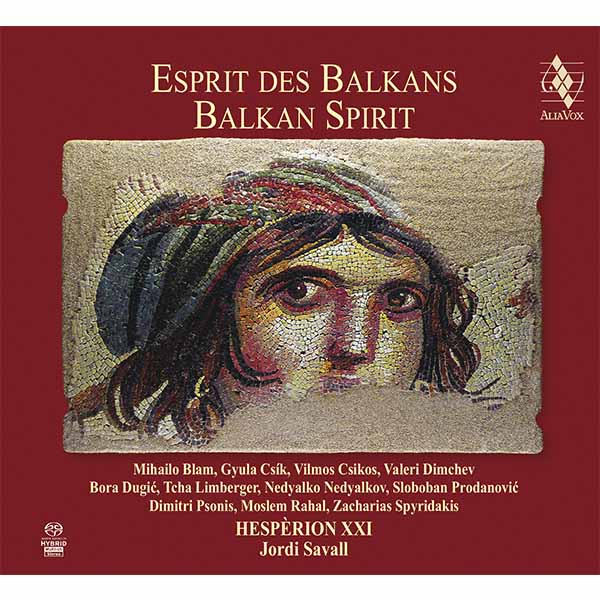ESPRIT DES BALKANS
Balkan Spirit
Hespèrion XXI, Jordi Savall
17,99€
Reference: AVSA9898
- HESPÈRION XXI
- Jordi Savall
Despite their turbulent history and their linguistic and political fragmentation, the peoples of the Balkans still share a great many cultural traits and the legacy of their historical past. And it is their shared features that we wish to highlight in this first recording along with our guest musicians from the various cultures, religions and regions. With them we have studied, selected, prepared and recorded a variety of pieces to create a beautiful musical anthology, combining the ancient, the traditional and the popular from this fascinating and still very mysterious part of Eastern Europe. We firmly believe that the emotion, vitality and beauty of all these musical expressions will help us to understand more fully what can be seen as the musical image of the authentic “Spirit of the Balkans.”
The idea of embarking on a major musical and historical project on the peoples of the Balkans and the Gypsy and Sephardic diasporas, was born towards the end of 2011 during the preparations for a concert dedicated to the city of Sarajevo, which we gave as part of de Barcelona’s Festival Grec on 9 July, 2012. Twenty years ago, during the tragic events of the war which led to the disintegration of the former Republic of Yugoslavia, the city had suffered a terrible siege by Serbian troops, more than 12,000 people were killed and more than 50,000 were seriously wounded. Europe in particular, and the whole world in general, responded with absolute silence and a more than questionable decision not to intervene in the conflict, the consequence of which was a brutal four-year siege of the Bosnian capital (1992-1996). International intervention did not decisively come about until 1995, but by then more than twenty thousand tons of missiles and shellfire had already disfigured for ever the physical and human geography of a city which for centuries had been the cultural crossroads of the Balkan peninsula where the traditions of the Slavonic world, both Orthodox and Catholic, existed side by side in perfect harmony with more recent cultural traditions such as Islam, brought by the Ottoman Turks – who ruled the Balkans for more than four hundred years – and Judaism, brought by the Sephardic Jews who found refuge there after being expelled from the Iberian Peninsula in 1492. As Paul Garde observes, “This last Balkan war broke out suddenly in Europe after half a century of pacification when the more troubled chapters of its history lay forgotten. Hence the incomprehension and the suspicion directed against the region, and the resurfacing of stereotypes which portray it as eternally doomed to a pattern of killing and misery.” Still regarded as the “powder keg of Europe”, we should not forget, as Predrag Matvejević points out, that the Balkan Peninsula was also “the cradle of European civilisation.” A peninsula forming part of the Mediterranean world, which stretches from the island of Cythera in the South, to the Danube and the Sava in the North, but one in which, as Georges Castellan points out, “the olive tree does not actually reach as far as Istanbul, and the Bulgarian countries owe nothing to the soft breezes of the Mediterranean.” And yet, from the Peloponnese to Moldavia, despite the changing landscapes, the towns and villages have much in common: everywhere there are dome-topped Byzantine churches, often a mosque, and the corbelled buildings (çardak) and inns (han), and caravanserai or caravan stops, that are to be found both in Patras and in Bucharest, in Skodra and in Plovdiv, not to mention the pavement workshops where the craftsmen invite you to join them in a Turkish coffee as they hammer away at their copper plates. A family resemblance? Yes, undoubtedly that of diverse peoples who, after a long shared adventure, have constituted within Europe a distinctive cultural expression.” Observant travellers pointed to a certain style of living, a sort of “spirit” of the Balkans, which combines a laid-back approach to life, conviviality and above all a sense of hospitality, a fundamental value that is still greatly respected by all Balkan societies, and in particular continues to be cultivated in rural areas.
+ information in the CD booklet
JORDI SAVALL
Bellaterra, Spring 2013
Translated by Jacqueline Minett
Selected Bibliography and Works consulted:
–Timothy Rice. Music in Bulgaria: Experiencing Music, Expressing Culture. New York: Oxford University Press 2004.
–Jean-Arnault Dérens et Laurent Geslin. Comprendre les Balkans. Histoire, sociétés, perspectives. Paris: Éditions Non Lieu 2010.
–Georges Castellan. Histoire des Balkans: XIVe-XXe siècle. Paris: Fayard 1991.
–Paul Garde. Les Balkans – Héritages et évolutions. Paris, Ed. Flammarion, Champs actuel, 2010.







Share